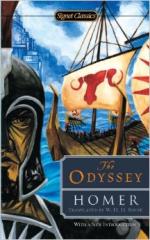|
|
The Odyssey Book 3
The ship sails into the rising sun as on the shore nine bulls are sacrificed to the gods. In Pylos when they beach the ship, Telemachus is hesitant to continue, but Athena, disguised as Mentor encourages him to be brave and go to Nestor because "he will tell you history and no lies" Book 3, line 24. Telemachus asks her how to speak respectfully to Nestor and she just tells him to trust that his mind will give him the right words. They turn and walk together to the altars of Pylos where Nestor is sitting on his throne. Peisistratos and Thrasymedes welcome the visitors and Nestor asks Athena (still in the form of Mentor) to invoke Poseidon in the sacrifice. She does as he asks but grants the prayer herself. They feast with their hosts and then Nestor asks Telemachus why he has come. Telemachus answers that he is not on official business from Ithaca but personal, to inquire about the fate of his father. Nestor begins to tell the story of the nine years of the Trojan war praising Odysseus wherever appropriate, then he turns to Telemachus:
"Well I must say I marvel at the sight of you:
your manner of speech couldn't be more like his;
one could say No; no boy could speak so well.
And all that time at Ilion, he and I
were never at odds in council or assembly" Book 3, lines 131-5
He tells them that after the sack of Troy the gods decided to make life hard for the Greeks. First, the Greeks held an assembly at sundown, which is wrong in itself, during which Agamemnon and Odysseus argued with each other in front of the troops. The forces split: half stayed in Troy, half left under Menelaus. When Menelaus' men stopped to make a sacrifice, Odysseus turned around with the Ithacan contingent to plead with Agamemnon. Nestor stops reminiscing and refers to news from Idomeneus in Crete that Agamemnon was killed by Aegisthus, who was in turn killed by Orestes. Telemachus states that he wishes he were as brave as Orestes and could exact that sort of revenge. Nestor has heard of what is going on with the suitors in Ithaca and he asks Telemachus whether or not the people side with him. He also mentions that Athena used to protect Odysseus and will probably also help Telemachus. He also expresses hope that Odysseus will return home and avenge himself. Telemachus doesn't want to believe this, but Mentor (Athena) criticizes him for not having faith saying that Odysseus may already be on his way home because his fate has been better than Agamemnon's. Telemachus replies "Mentor, grievously though we may miss my father/ why go on as if that homecoming could happen?" Book 3, lines 258-9. Nestor retells the tale of Orestes and Aegisthus. A minstrel had been left to care for Clytemnestra but Aegisthus had 'taken care' of him. Menelaus and Nestor came home together but there was a storm and Menelaus was blown to Egypt where he made a lot of money while Aegisthus continued to rule Argos. In the eighth year, Orestes returned and killed his mother and her lover. Menelaus returned from Egypt with ships full of gold. Then he turns again to Telemachus: "don't stay too long away from home, leaving/ your treasure there, and brazen suitors near;/ they'll squander all you have or take it from you," Book 3, lines 341-3.
He tells Telemachus that Menelaus will know more than he and then continues to talk until the sun goes down. Athena suggests they should offer a sacrifice and then retire. Telemachus turns to go to his ship, but Nestor stops him and tells him it would be shameful unless he and Mentor would sleep in his house. Mentor says he must leave, but advises Nestor to send Telemachus to Sparta in a chariot and gives elaborate instructions for the sacrifice of a heifer. Athena leaves and the rest go to Nestor's house where they mix wine and pour libations. At dawn Nestor sends for his sons and gives them the mission of fitting a heifer with golden horns for sacrifice and to prepare a feast. His sons leave and the errands are accomplished. They feast and prepare more food. The horses are harness and given to Telemachus. Peisistratos is to leave with him. They are to begin the journey in the morning.
"That day they made the grainlands of Laikedaimon,
where, as the horses held to a fast clip,
they kept on to their journey's end. Behind them
the sun went down and all the roads grew dark." Book 3, lines 539-42
Topic Tracking: Journeys 2
Topic Tracking: Disguise and Deceit 3
Topic Tracking: Guests and Hosts 2




